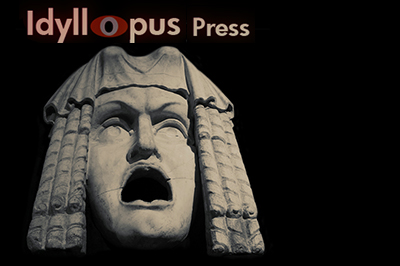STANLEY KUBRICK'S THE SHINING

Go to TOC for this film ( (which has also a statement on purpose and manner of analysis and a disclaimer as to caveat emptor and my knowing anything authoritatively, which I do not, but I do try to not know earnestly, with some discretion, and considerable thought).
MONDAY
Dad really needs some good sleep
TOC and Supplemental Posts | Part 1 - The First Ascent | Part 2 - The Interview | Part 3 - Closing Day |
Part 4 - A Month Later | Part 5 - Tuesday | Part 6 - Thursday | Part 7 - Saturday | Part 8 - Monday |
Part 9 - Wednesday Part One | Part 10 - Wednesday Part Two | Part 11 - 8 AM | Part 12 - 4 PM |
Films Home
LINKS TO SECTIONS OF THE ANALYSIS ON THIS PAGE:
The Summer of 42, Shots 246 through 247
The Summer of 42 and Room 242 at the Enchanted Hunters Hotel.
Jack Reassures Danny Everything's OK, Shots 248 through 253
M-I-C-K-E-Y-M-O-U-S-E
But Why, After All, Touchdown Mickey?. Is there a reason? Does there have to be a reason? Seems it would have to do with WWII.
Jack's Single Conversation with Danny. The red car on the window sill as a presage of Dick's Snowcat.
In Review, What Has Kubrick Given Us in This Section?
What's the teaser candy bait?
What's the food for thought?
What's the discration?
What's the deep infrastructure?
THE SUMMER OF 42
THE SUMMER OF 42 AND ROOM 242 AT THE ENCHANTED HUNTERS HOTEL
For more information on the use of The Summer of 42 in this section, see the post The Shining, The Birds, and The Summer of 42. I cover the movie The Summer of 42 in depth, as well as the book, and possible relationships to The Shining.
246 Title card. Monday. (51:15)
247 CU television. (51:18)
This time we don't open with a view of the exterior of the lodge. Instead, the we view a washed out, blue-toned scene from a movie, The Summer of 42. The other time there wasn't a shot of the lodge (with the exception of The Interview, and the opening credits seemed to have served the function in that case) was the Thursday section, the bulk of which, after a brief shot of Wendy and Danny playing in the snow, had to do only with Jack seeming to be shining as he faced the window. This section as well features primarily Jack. After a brief opening scene with Danny and Wendy, Danny goes up to their suite and, again, we see Jack in a disengaged state, staring either out the window or preoccupied with some inner vision. What is he watching at the same time Wendy is watching the movie?
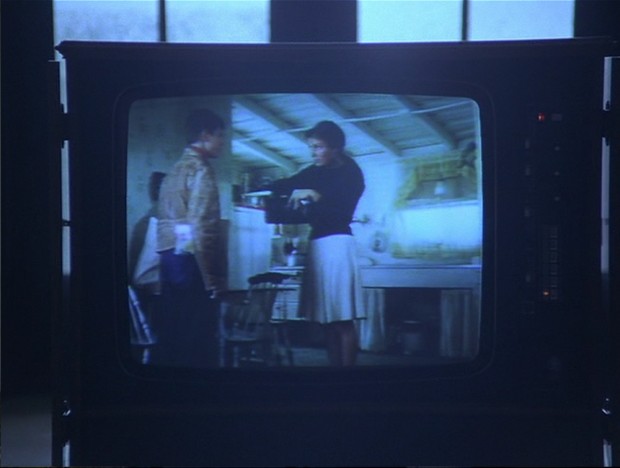
Fig. 1 - Zooming out from "The Summer of 42".
The summer of 42 is a coming of age film in which a man tells a story of a memorable summer had when he was fourteen. He had grown infatuated with a lonely woman whose husband was away serving in WWII, and they had a one night sexual liaison when she learned her husband had been killed. I write on this at length in the post The Shining, The Birds , and The Summer of 42.
The camera zooms out from the television's screen, the woman asking the boy to let her give him some money (for bringing in her groceries) and he saying he wouldn't think of it. She asks the smitten youth how she can repay him and they settle on coffee and donuts.
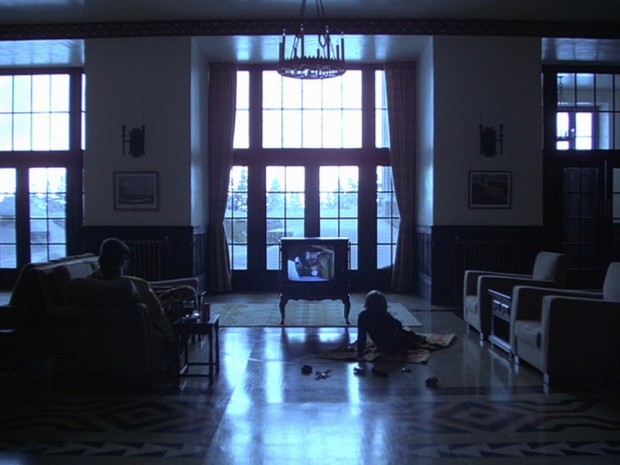
Fig. 2 - Danny and Wendy watch the movie on a television which has no electrical cord.
JENNIFER O'NEILL AS DOROTHY: Please let me (unintelligible) some money.
GARY GRIMES AS HERMIE: I wouldn't think of it.
DOROTHY: Well, then, how can I repay you?
HERMIE: It's okay, really.
DOROTHY: Well, I'm going to have some coffee. Would you like some?
HERMIE: Sure.
DOROTHY: Great, sit down. Oh, marvelous, donuts. Help yourself. Coffee will be ready in a minute.
In the midst of winter there is summer. Oppositions.
The 42 may return us to Danny's raglan sleeve shirt with the number 42, which he was wearing when he first saw the vision of the Grady girl(s) and the bloody hallway in the bathroom in Boulder. As this occurred, a television had been playing an old movie, Carson City in the living room.
There appears to be no electrical cord leading to the television, as if even it is shining, playing burnt toast, pictures of things that have happened. The television functions as a kind of Lontano, "at a distance", the musical composition with multi-layers of doublings that had been playing during the Thursday section of Jack's shining, on Saturday when Wendy discovered the phone lines were down, when Danny saw the twins in the game room, and then when he shined with Hallorann in the "story" room.
Wendy rests on the sofa to the left of the television, appearing to still wear the yellow jacket she wore on Saturday. Danny sits on a blanket on the floor with some toys.
DANNY: Mom?
WENDY: Yeah?
DOROTHY: Oh, you drink coffee, don't you?
DANNY: Can I go to my room and get my fire engine?
WENDY: Not right now. Daddy's asleep.
HERMIE: Oh, no. I take it black.
DANNY: I won't make any noise.
DOROTHY: Are you in high school?
WENDY: Now, come on, Doc. He only went to bed a few hours ago. Can't you wait 'til later?
HERMIE: Next year I'll be a junior.
DANNY: I won't make a sound, I promise, I'll tiptoe.
DOROTHY: Don't be in too big a hurry. You could end up in the army.
WENDY: Well, all right.
HERMIE: Well, I'm prepared to go.
WENDY: But really don't make a sound.
DANNY: I won't, mom.
WENDY: And make sure you come right back 'cause I'm going to make lunch soon. Okay?
DANNY: Okay, mom.
From a 1971 article in "Life" magazine, on the producer, Richard Roth, feeling The Summer of 42 had been unfairly given an R rating, and speaking about it to Dr. Aaron Stern, a psychiatrist who was the full-time administrator of the ratings system:
Summer of '42, Roth learned from Stern, "contains the fulfillment of every little boy's dream--to sleep with an older married woman, an incestual relationship." The new motion pictures, Stern believes, are upsetting audiences not only with what is visual on the screen, but with what is hidden, carried "subliminally" by the theme.
As will be made clearer later, one of the myths employed in The Shining is that of Oedipus, the man who slew his father and married his mother, a tale of inescapable fate, preordained paths. The Playgirl magazine Jack had been reading in the Closing Day sequence had on the cover the title of a story, "Incest: why parents sleep with their children". So, are we looking for possible sexual abuse subtext in the film concerning Danny? There are people who hold that we are, some blaming Jack and others blaming Wendy. I've not gone after it as I personally don't get any indication of such. Instead, I think The Summer of 42 foreshadows in particular Jack's encounter in Room 237, as the woman he kisses transforms from a young woman into the corpose of a woman old enough to be his mother or grandmother, but I'll leave that for the next section. I've also written on the what I think is going on in The Shining, The Birds , and The Summer of 42.
For what it's worth, I don't think the Oedipal tale is about a man literally and accidentally marrying his mother. The myth has to do with the conflict of fate and the desire to exert free will. Every Kubrick film deals with the conflict of destiny and free will.
I suppose it should be noted that in Vivian Kubrick's documentary of the making of The Shining, James Mason makes an appearance, visiting from the set of a Sherlock film in which he was playing Dr. Watson. The film was Murder by Decree, based on Jack the Ripper: The Final Solution, in which a Masonic conspiracy covers up the fact it was a noble who carried out the murders. I am less interested in any comparison being drawn between Jack the Ripper and Jack with his axe, than the term "The Final Solution" having been used in the title of the book, as "The Final Solution of the Question of the Jews" was the code name for the plot concerning their extermination by the Nazis.
Mason is dressed in late 19th century attire and is accompanied by several individuals, including two young girls. On the set for Suite 3, they meet with Jack and Shelly. James Mason was in Kubrick's Lolita, playing Humbert Humbert who molested his step-daughter. That relationship was initiated during the summer at the Enchanted Hunters hotel in room 242. Just prior, as a joke, Lolita woke up Humbert claiming the hotel was on fire and burning right down to the ground.
Synchronicity as a partner to destiny, Charlotte Haze's house number was 242.
As noted in the previous section, we had a cycle (ShuV) in the call sign KDK used on the radio, a return to the beginning. We also could say that is here with 242. In gematria, the letter K, kaph, happens to equal 20, and D, daleth (delta, a pictograph of a door), happens to equal 4. One could say in room 242 of the Enchanted Hunters Hotel of Lolita we have something akin to KDK, or 20-4-20.
Or maybe not. My preference is usually to stay away from gematria as numbers get tricky. For instance, if we look at KDK in respect of their numerical positions in the alphabet we get 11-4-11, and that brings up Kubrick's repetitive use of CRM or CRM-114, which I look upon as being expressive of ChRM, something that is isolated, separated off from society, even "condemned" as if devoted to a religious purpose. I've written at length on my reasoning elsewhere.
It is kind of interesting, however, that we could also see in KDK this 114 via 11-4-11.
It is interesting except that nothing concerning numbers will be of interest to those only interested in a general analysis and who are unacquainted with Kubrick's consistent use, in all his films, of certain numbers such as 42/24 and 114.
But, to return to Summer of 42 and Lolita, and Lolita and Humbert staying in room 242, and Lolita waking Humbert up with the joke that the hotel is burning down and then he having sex with her--as it is now that Danny makes his request to get the fire engine, Kubrick could be making a reference to Lolita. But why? If one examines The Shining, there is only one intimate scene between Jack and Danny, which now occurs, and during it Danny senses in Jack a potential for harm and asks Jack if he would ever hurt them. Lolita's relationship with Humbert was already so scrambled, she didn't have sufficient knowledge to comprehend how she was wronged by Humbert, and that she wasn't at fault. Danny, on the other hand, has seen how the Grady girls ended up, he's had Tony telling him this wasn't a good trip to make, and he's pretty circumspect of a father who has proven to be unreliable.
JACK REASSURES DANNY EVERYTHING'S OK
M-I-C-K-E-Y-M-O-U-S-E
248 Crossfade from the lobby to the interior of the door to Suite 3. (52:37 begin crossfade to door, ending at 52:40.)
We now have a crossfade from Wendy continuing to watch the Summer of 42 to the door of the Torrance's suite as viewed from the interior, its doorknob turning. Danny opens it and quietly enters.
In the Tuesday section, Danny had tried the doorknob to Room 237 and found it locked. In the Wednesday section, the Room 237 door will be unlocked, just as this door is prominently unlocked, its chain undone. This door stands between the two, as if its being unlocked and opened helps facilitate the later opening of Room 237.
In the crossfade, the door to the suite forms a dividing line through the previous scene in the lobby. The knob and keyhole are situated directly above where Danny had been resting on the blanket, united with him.
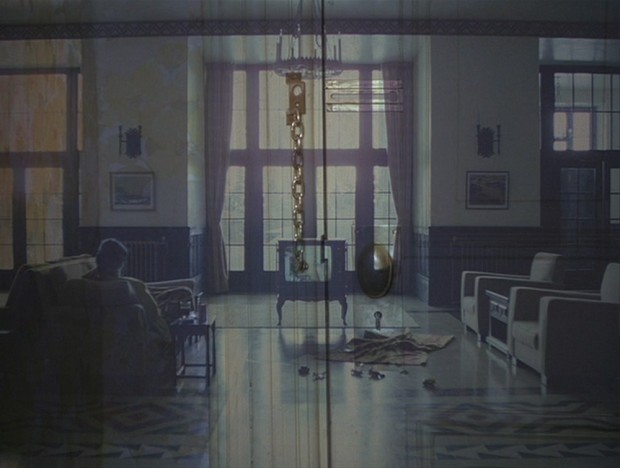
Fig. 3 - Crossfade from the television to the interior of the door of Suite 3.
We see Danny is wearing a red plaid shirt with a blue sweater over it on which is an old version of Mickey Mouse kicking a football, perhaps to do with the 1932 film "Touchdown Mickey". I've watched that cartoon, however, and didn't see in it Mickey kicking the ball, but it is certainly a Mickey from that period, before 1939, when Mickey's eyes changed from their black button form.
Let's take a look at the possible word play here. The keyhole for the door had been where Danny was seated. He's wearing a Mickey Mouse sweater. Mic-key. One could suppose a key is being expressed here in some fashion. i'm not attached to that idea. However, in a way, the ball being rolled toward Danny, after which he finds the door to Room 237 open, is being anticipated here visually. Danny opens this door and we now have a clear view of the sweater he wears, Mickey Mouse punting the football.

Fig. 4 - Danny, in his Mickey Mouse sweater, tiptoes.
In Full Metal Jacket Mickey Mouse appeared several times. He was referenced just before Hartman was killed in the lavatory by the "Section 8" Pyle. Finding Joker and Pyle in the bathroom, Pyle making a disturbance, Hartman asks, "What is this Mickey Mouse shit? What in the name of Jesus H. Christ are you animals doing in my head?" Head is intended to mean bathroom, but is also layered and we can see linkages to the idea of voices in Pyle's head as well as Jack's.
Pyle had taken on the glare of Jack in The Shining and after killing Hartman had blown out his own brains. Later in The Shining we have, in a bathroom scene, Jack informing Delbert Grady of his forgotten history, how he had murdered his family and blown out his brains with a shotgun. (Which is a reason I don't care for Full Metal Jacket. Jack had already done Jack. We didn't need Pyle doing Jack.)
At the end of Full Metal Jacket the Marines sing, "M-I-C-K-E-Y M-O-U-S-E. We play fair and we work hard and we're in harmony." That takes us back to Jack's repeating the phrase over and over again, "All work and no play make Jack a dull boy."
The Mickey Mouse references in Full Metal Jacket link back to The Shining with the made-up work and play lyrics sung to the Mickey Mouse Club theme song.
There had been a conjunction of Mickey Mouse and 42 earlier in the movie, on the day of the interview. Mickey Mouse was on Danny's bedroom door, his hand held out apparently toward Snoopy under the rainbow. As the camera zoomed in past this on Danny in the bathroom, we then saw the number 42 on the arm of Danny's shirt.
BUT WHY, AFTER ALL, TOUCHDOWN MICKEY? IS THERE A REASON? DOES THERE HAVE TO BE A REASON? SEEMS IT WOULD HAVE TO DO WITH WWII
There may very well be a reason for it being Touchdown Mickey. I find there used to be a story that on September 1, 1939, the BBC shut down for security reasons, on the day that Germany invaded Poland, two days before Britain declared war on Germany. Wikipedia states they were concerned VHF transmissions would "act as a beacon to enemy aircraft homing in on London". The BBC wouldn't return until after WWII. Public memory had the programming shutting down abruptly during a Mickey Mouse cartoon, but which one? Some said programming was interrupted when Mickey was kissing Greta Garbo in Mickey's Gala Premiere.
Radio TImes' published schedule showed that "Touchdown Mickey" was playing at 3:30, when BBC went off the air. But the Television Heaven website relates that another document of the broadcast log shows "Mickey's Gala Premier" played at 12.05.05. This was followed at 12.13.00 by "Sound and vision tuning signals (for Test Purposes)", and then the broadcast closed at 12.35.00. Television Heaven states there's no known reason why "Mickey's Gala Premiere" replaced "Touchdown Mickey", and why it played so much earlier.
Recollect that the phone lines are down. Wouldn't it stand to reason the electric lines are down? Perhaps the hotel has its own generator. But doesn't it seem unlikely they would be able to get television programming, and Kubrick has pointed that out to us with the television not seeming to show a cord plugged into the wall. Again, we have the theme of isolation. But what Kubrick is seeming to tell us is that we are seeing things that couldn't be happening. The television shouldn't be playing the movie. Like the BBC programming, with the onset of WWII, there should be dead air. We are placed in the position of not knowing what we are watching. Is the broadcast a ghostly apparition courtesy of the hotel or is this more on the surreal/expressionistic layer that informs the viewer the film can't be comprehended as "realistic". That we need to look at it another way.
In "Mickey's Gala Premiere"", when Garbo is kissing him it is on stage in Hollywood after a grand premiere of a cartoon he's in. As Garbo is kissing him, he wakes up, at 12:55, to find his dog, Pluto, licking him. The Garbo kiss was a completely different real life, the Pluto kiss, made into another story by the sleeping Mickey's dreaming mind. We might compare this to when Jack is in Room 237, begins kissing a beautiful woman, and then finds instead it is the corpose of an old woman.
Knowing what we do about "Touchdown Mickey" and WWII, we may now look at Mickey kicking the football, which doesn't happen in "Touchdown Mickey"", examine again his posture, and see it in a different light when we look at an image of goose--stepping soldiers from the invasion of Poland.


JACK'S SINGLE CONVERSATION WITH DANNY - THE RED CAR ON THE WINDOW SILL AS A PRESAGE OF DICK'S SNOWCAT
Danny has but 3 conversations of any length in the film. He dialogues with his mother over lunch while Jack is at his interview. He dialogues with Dick on Closing Day while he parents are going down to the basement to look at the boiler. And he speaks with Jack, here, having gone up to the suite to get his fire truck.
Quietly, Danny has entered the suite and climbed up the stairs. Rather then cutting to Jack, the camera does a quick pan over to Jack sitting on the bed, staring out the window, an uncomfortable image of his disheveled father in his blue bathrobe and dark blue long johns. As Danny ascended the stairs into the suite, he did so quietly but his posture was normal. Yet at the the height of the stairs, as he comes in view of the rest of the apartment, he suddenly shifts his posture and leans back, his arms swung out behind him, taking on briefly the upper body posture of Mickey Mouse on his sweater. Kubrick would seem to be then having Danny as kicking Mickey Mouse's ball in the direction of Jack, Jack now turning to look at Danny, noticing him.
Only, later, when Danny climbs out the bathroom window to escape Jack, will we realize that Jack is sitting on the edge of the bed with light shining on him from a bedroom window which couldn't possibly exist.
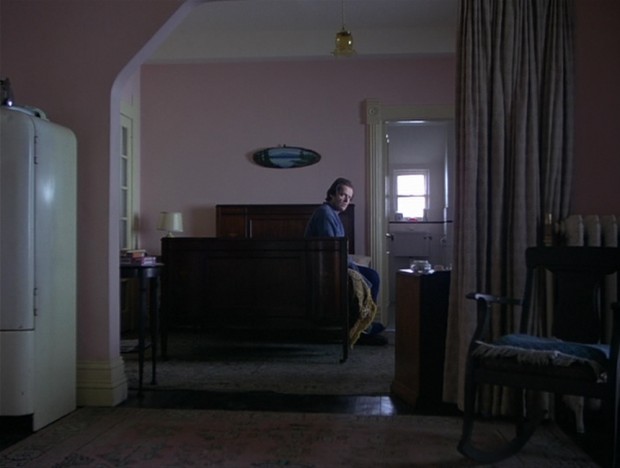
Fig. 5 - Danny sees that Jack is already awake.
249 MS from behind Jack. (52:23)
From behind Jack we then see him looking toward Danny, along with Jack's reflection in the mirror, as if there are two Jacks and one Danny. The summery painting of the mountain above the lake, in the mirror (this would be Mt. Hood seen in Mirror lake), takes on the appearance of a blue eye in the cloud shape of the mirror. We see on the dressing table a vase of fake flowers which was missing in shot 248. These stand out with one of the flowers being red.
A friend has mentioned to me that Jack's image in the mirror is cut off at the waist but the jeans on the stool below complete the image of a person, providing the mirror image his legs, and notes how this can also connect with the idea of the half-man half-bull minotaur.
DANNY: Can I go to my room and get my fire engine?
JACK (raising his hand toward Danny): Come here for a minute first.
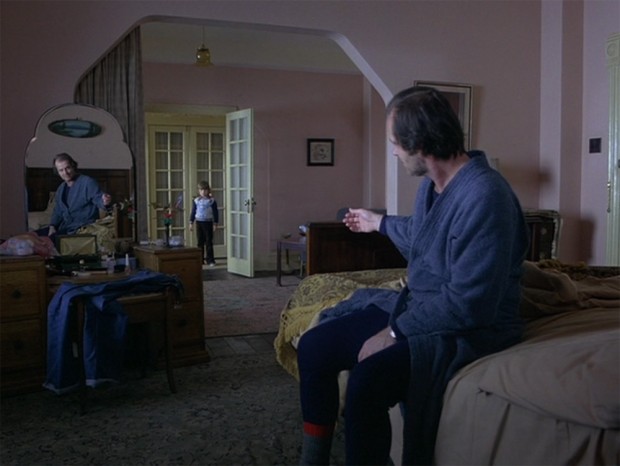
Fig. 6 - Jack's reflection in the mirror seems to be slightly smiling, while from the rear he only appears grim.
In the mirror, Jack seems to present another face, as if he is smiling, though we can tell from the side he is not, so we have at least two perceptions of Jack, the smling one and the dour one. Danny hesitantly asks if he can please go get his fire engine and Jack calls for Danny to come sit with him. The boy complies but is obviously guarded.
Jack's smile, in the mirror, is in opposition to his grim face, and is seen also in one of the two girls sometimes appearing to be vaguely smiling while the other is not. There are other instances of this in the film and I comment on them in their sections.
250 MS Jack. (53:46)
Viewing the non-mirror Jack again, the oval painting of the mountain in summer is now missing above the bed. Not only that, but the lamp on the bedside table has changed. It previously had a white base and an unpleated shade. Here, the base is wood and the shade is folded in pleats.
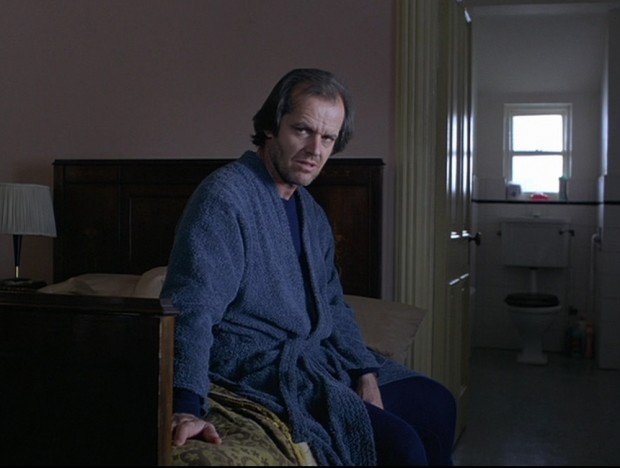
Fig. 7 - The painting above the bed is gone. A red car rests on the bathroom's window sill.
If we examine Danny's sweater there may be certain correspondences had with the scene. If Danny swings his arms back in a representation of Mickey Mouse, the ball is perhaps observed in the oval painting of the mountain in summer above the bed. There may be some support in connecting the painting with the football when we compare the strong horizon line in the sweater with the strong black horizontal line that bisects the bathroom.
The friend who noted the jeans on the stool became legs for the mirror Jack, observed also that in the bathroom window is the trapezoidal shape of what she believes to be a red toy car. This presages the trapezoidal/triangular shape in the ch O king poster later, and also perhaps calls attention to the window through which Danny will later escape. This scene is the only one in which we see the red toy in the window. In other scenes there are cleaning products set on the lid of the toilet tank or on the bathroom's window sill.
I have already begun to comment some on the nature of the trapezoid, and a little on how Kubrick uses trapezoids, in the Tuesday section, in respect of the disappearing chair and table. We have had a disappearance here as well, the painting above Jack's head disappearing after we view his reflection in the mirror. When Danny first sees Jack we see the painting, then when we view the alternative perspective of Jack in the mirror, we see a reflection of the painting as well as a vase of flowers which had been previously absent. After that, all that we know is the painting is missing when Danny sits on Jack's lap. It is when Danny is sitting on his father's lap that we get a clear view of the trapezoid figure in the window.
So, three perspectives. The perspective with the painting and no flowers. The perspective with the painting (at least in the mirror) and the flowers. Then the perspective with no painting (we don't know if flowers are there or not). Repeatedly, we have these three perspectives.
That we see the red trapezoidal car toy here, but not elsewhere, and in conjunction with Jack's cuddling Danny and placing his hand on the side of his neck is certainly intentional and likely related to the CH O K ING posters.
Danny enters the shot and Jack places Danny on his knee, embraces and kisses him tenderly if somewhat uncertainly, stroking his hair.
He asks him, "How's it going, Doc", as if he is earnestly trying to make a connection. Danny distantly replies, "Okay."
JACK: How's it going, Doc?
DANNY: Okay.
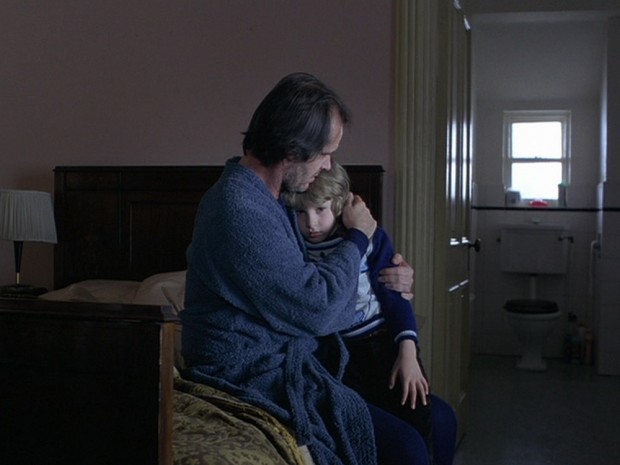
Fig. 8 - "How's it going, Doc?"
There is a great tension in the shot, the conflict of the father's expression of affection and the boy's mistrust--Jack's hand on Danny's neck and shoulder in such a way, Danny ducking his head uncomfortably, fearfully, that when we later see the injuries on that side of Danny's neck, inflicted in Room 237, we may well return to this scene and think upon Danny's fear and unease here finding expression in the story of the crazy woman in Room 237 choking him. The red truncated triangle (perhaps a car) in the bathroom window takes us also to Room 237 via the CH O KING poster. We get a fairly clear view of the poster in the basement while Wendy is down there checking the boiler, Jack meanwhile dreaming in the Colorado Lounge, Danny in Room 237 having his confrontation.
Kubrick presents the same image, rephrased, in Eyes Wide Shut when Bill is checking the glands of the boy's neck and we see the eye poster behind him with the giant O at the top of it.

Fig. 9 - Bill, in "Eyes Wide Shut", examining a boy's glands.
The boy slightly flinches and Bill asks if that hurts. Did Bill choke the child? No. Does Jack choke Danny? No. We see Danny before he enters Room 237, in the next section, and his neck is fine.
And yet Danny will later appear with choke marks on his neck and we are given cause to look back to this scene.
251 MCU Danny on Jack's knee. (54:16)
JACK: Having a good time?
DANNY: Yes, dad.
JACK: Good. I want you to have a good time.
DANNY: I am, dad. Dad?
JACK: Yes.
DANNY: Do you feel bad?
JACK: No, I'm just a little bit tired.
DANNY: Then why don't you go to sleep?
JACK: I can't. I've got too much to do.
Bartok's Music for Strings, Percussion and Celeste begins. This had accompanied the earlier maze sequence when Jack overlooked the indoor maze as Danny and Wendy wound their way about it outside. The same music was played in the scene where Danny approached the forbidden Room 237 and found it locked but then saw a vision of the girls. We are reminded that just as Dick had told him never to go to that room, Wendy had just told Danny not to go to this suite, but Danny had talked her into letting him go.
DANNY: Dad?
JACK: Yeah?
DANNY: Do you like this hotel?
Jack's demeanor slightly changes, becoming less intimate and more animated, less grim.
JACK: Yeah, I do. I love it. Don't you?
DANNY: I guess so.
JACK: Yeah. I want you to like it here. I wish we could stay here forever and ever and ever.
Jack repeats the phrase the girls had used in the Saturday vision in the staff hall when they had asked Danny to come play forever and ever and ever. Whereas Jack only works, the girls had offered the opportunity to forever play--but there is nothing playful about them, they represent a bloody murder. Not desirable playmates. The vision of the girls, considering this conversation Danny has with Jack, seems to act more as a warning to Danny than an invitation made by them. His going to play with them would be contingent on his being murdered as well.
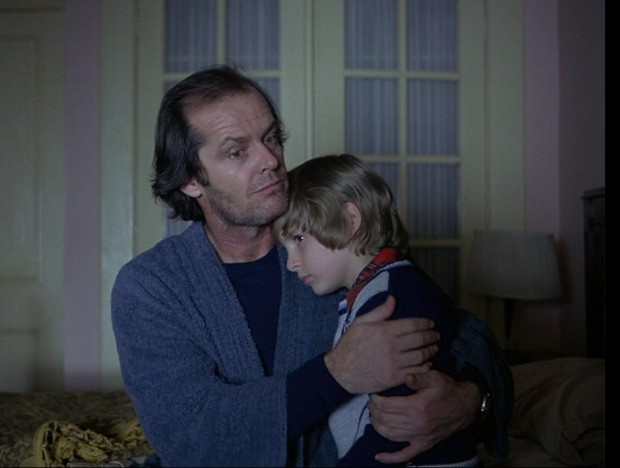
Fig. 10 - "Forever, and ever, and ever."
Perhaps from having been reminded of the girls, Danny asks...
DANNY: Dad?
JACK: What?
DANNY: You wouldn't ever hurt mom and me, would ya?
JACK (becoming...weird): What do you mean?
252 MS of Jack, Danny and the bathroom. (56:17)
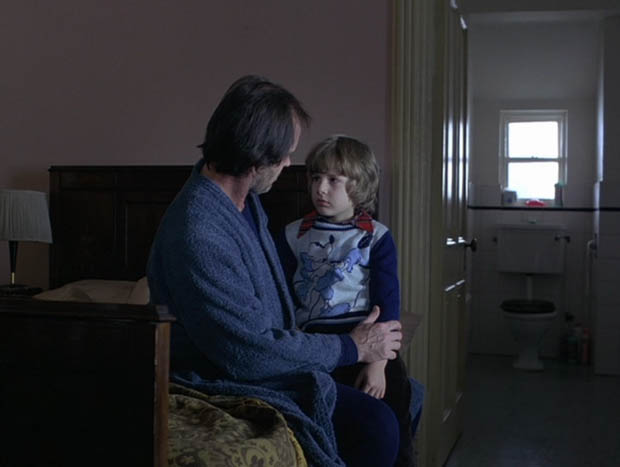
JACK: Did your mother ever say that to you? That I would hurt you?
DANNY: No, dad.
JACK: Are you sure?
DANNY: Yes, dad.
253 MCU Jack on Danny's knee from the front. (56:34)
Begin swirling, revolving scales, the xylophone playing the Fibonacci sequence.
JACK: I love you, Danny. I love you more than anything else in the whole world. I would never do anything to hurt you. Never. You know that, don't you? Huh?
DANNY (glum): Yes, dad.
JACK: Good.
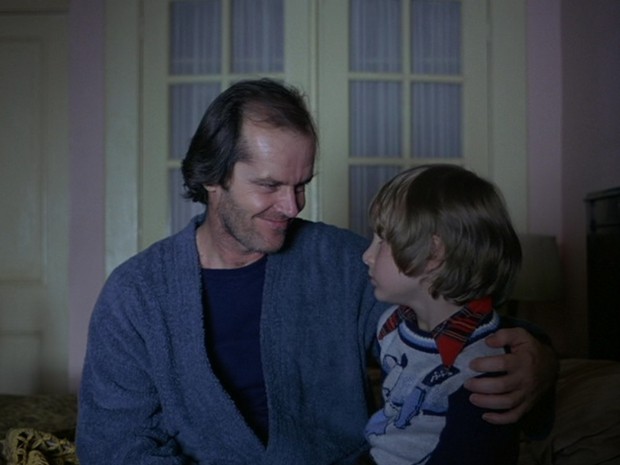
Fig. 11 - Jack gives Danny a big, unreassuring grin.
But there is something malicious in Jack's look. In the way he has of dropping his head and arching his brows when agitated, Jack's expression might be said to resemble the Minotaur, a man with a bull's head, a person whose mind could be considered as governed by unreasonable passion.
One realizes that, at least in the movie, it's Wendy who is the one observed working about the lodge. Though most of her activity concerns the kitchen, she will be observed working in the boiler room, which Stephen King in his book linked to the passions of rage. In the book, it was vitally important to keep the boiler within a safe range else it would blow the place up. Kubrick chose not to place that emphasis on the boiler, and doesn't have it blow up at the end, as it does in the book.
Danny is observed only playing with Wendy, never playing with Jack. Though Danny and Wendy have spent time exploring the hotel and its grounds, Jack, at least in the movie, is depicted as having almost no interest, confining himself largely to the Colorado Lounge.
Yet it is Jack here who feels pressed, overwhelmed with work. The most obvious explanation is that he's overwhelmed by the book he's had difficulty writing, but one may instead wonder if he is perhaps exhausted by the weight of decades of the imperial demands of this massive lodge. History overwhelms him.
In review, what has Kubrick given us in this section?
Jack's scarily in sync with the scary girls. Actually, we already know Jack is scary and losing it so the section just kind of offers the audience a minute to catch its collective breath. We do also get a glimpse of Jack's tenderness for Danny, before he completely loses it, and Danny's hard-wired fear of him. But we already knew, too, that Danny doesn't trust his father.
What's the teaser candy bait?
Eventually people begin to notice other disappearing items but it is a little less obvious in the bedroom.
What's the Food for Thought?
The television set isn't plugged in.
What's the deep infrastructure?
Whatever is feeding that unplugged television set.
First placed online 2007-2009 in loose form. Added all shots 2012. Approx 5300 words or 11 single-spaced pages. A 40 minute read at 130 wpm.
NEXT: WEDNESDAY PART 1
Return to Table of Contents for "The Shining" analysis
Link to the main TOC page for all the analyses

